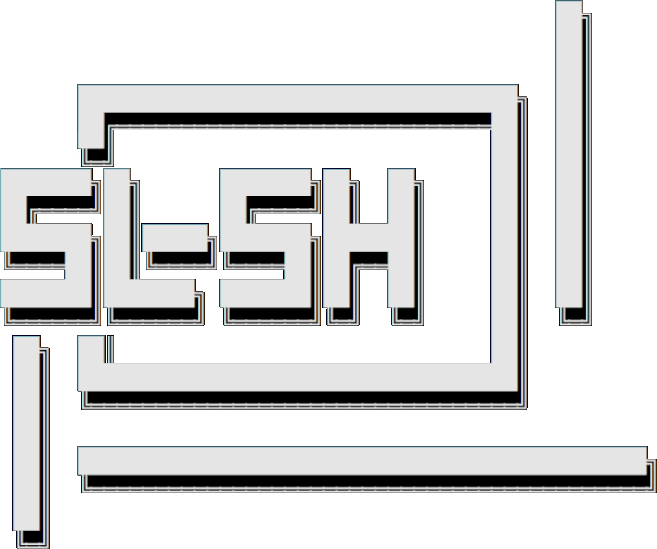Simple Lisp SHell (slosh) is a lisp based shell written in Rust. It is not POSIX compliant and makes no effort to be. Sl-sh should run on any *nix platform as well as macOS (CI currently only tests against ubuntu and macOS).It is a Lisp-1 that is heavily inspired by Clojure and Common Lisp. It is a shell, it is a scripting language, and it is a REPL.
Some of the more prominent features:
- The contains both a shell and a lisp reader so familiar bash-isms like
"just work"
cat file | tr -s " " | cut -d " " -f 2,4
- Support for an rc file,
~/.config/slosh/init.slosh, to set up environment and fully customize your prompt. - Common Lisp style macro system with support for quote and backquote (with clojure style ~ and ~@ expansion).
- Dynamically Typed
- Note lacks many features from legacy sl-sh but catching up (std lib is currently tiny).
Contains these crates:
- slosh: a REPL with debugger and extensions that use compiler, includes shell functionality.
- compiler: the core compiler code
- compile_state: helper crate with state contained by a VM for use with compiler
- vm: this is the bytecode VM that is target of the compiler
- builtins: set of some core builtins
- shell: contains shell specific code, this includes a shell reader (parser), job control etc
- bridge_macros: macros for exported Rust functions as slosh functions
- bridge_types: helper types for code using bridge_macros
- legacy (excluded): original sl-sh version, more complete but slower and worse core shell support
cargo run -p slosh
- Install git
git clone https://github.com/sl-sh-dev/sl-sh cd slsh
- Install Rust and build from source:
cargo build -p slosh --release ./target/release/slosh
- install binary
mkdir -p /usr/local/bin
sudo install -m 755 target/release/slosh /usr/local/bin/
- add slosh to /etc/shells and change login shell to slosh
echo /usr/local/bin/slosh | sudo tee -a /etc/shells
chsh -s /usr/local/bin/slosh
The slosh configuration file lives at ~/.config/slosh/init.slosh.
If you run slosh and the file does not exist, a default one will be created for you.
Review your existing shell configuration files like ~/.bashrc and ~/.bash_profile and manually translate them to slosh syntax and add to your init.slosh file
For example, export JAVA_HOME="/usr/local/opt/openjdk@11/bin/java" becomes (sh "export JAVA_HOME='/usr/local/opt/openjdk@11/bin/java'")
These are a subset of sl-sh forms and most work exactly the same. See the sl-sh docs at: https://sl-sh-dev.github.io/sl-sh/
- True
- False
- Nil
- String Constant
- Symbol
- Keyword
- Character (chars are grapheme clusters)
- Float (56 bit float)
- Integer (56 bit signed integer)
- Byte
- Pair/ConsCell
- Vector
- HashMap
- String
The following special forms are currently in the compiler:
- def
- set!
- do
- fn
- macro
- if
- quote (')
- back-quote (` supports ~ ~@)
- and
- or
- err
- let
- call/cc
- defer
- on-error
- while
Normal forms follow normal calling evaluation. Note: These are all compiled to bytecode and once compiled are not dynamic anymore.
- not
- recur
- this-fn
- type
- +
- -
- *
- /
- inc!
- dec!
- list
- list-append
- cons
- car
- cdr
- xar!
- xdr!
- vec
- make-vec
- vec-push!
- vec-pop!
- str
- =
- /=
- <
- <=
- >
- >=
- eq?
- equal?
- Lisp reader (no reader macros yet)
- Lisp lists (pair/conscell based)
- Vectors
- Tail call optimization
- Continuations (call/cc)
- Lambda/Closures (supports optional and variadic arguments)
- Garbage collection (basic but should function)
- Lisp back quotes (including nested back quotes)
- Macros
Slosh is the shell and scripting language REPL using the compiler, vm and shell crates.
These forms (written in Rust but callable from Lisp) are supported.
- pr (print)
- prn (println)
- dasm (disassemble a lambda or closure)
- load (load a lisp file and execute it)
- vec-slice (new vec that is a slice of old vec)
- vec->list (turn a vec to a list)
- get-prop (get a property from an object- either a global variable or a heap object)
- set-prop (set a property on an object- either a global variable or a heap object)
- eval (eval an expression)
- Line editor with history
- Debug on error, currently useful for probing VM state only
- sl-sh legacy shell: https://github.com/sl-sh-dev/sl-sh/legacy
- Install bencher
- To run benchmarks locally:
cargo bench - To upload benchmarks to bencher.dev:
bencher run "cargo bench" - Consider using iai in cloud: https://bencher.dev/learn/benchmarking/rust/iai/
The documentation site is served from the doc directory
based on the doc/mk-site.sh script referenced in the github action .github/workflows/gh_pages.yml.
Documentation can be built and viewed locally as the documentation site is a static set of html files generated from the source code.
All of this is covered in doc/README.md
Must be compiled in lisp-test mode for appropriate documentation functions to be present (cargo build --features lisp-test).
Just is a command runner much like make, but with a simpler syntax.
Optionally, you can install Just and use it to help easily test or build slosh.
You can also read the Justfile in the root directory to see the common commands that we use to test and build the project.
To verify you've installed Just, run just in the project root which should list all available commands.
Now you can run just test instead of the verbose sh scripts/check-clippy-version.sh && cargo fmt && cargo clippy && cargo test --workspace.
It's also possible to set up shell completion scripts which makes it quite quick to find the right command.
